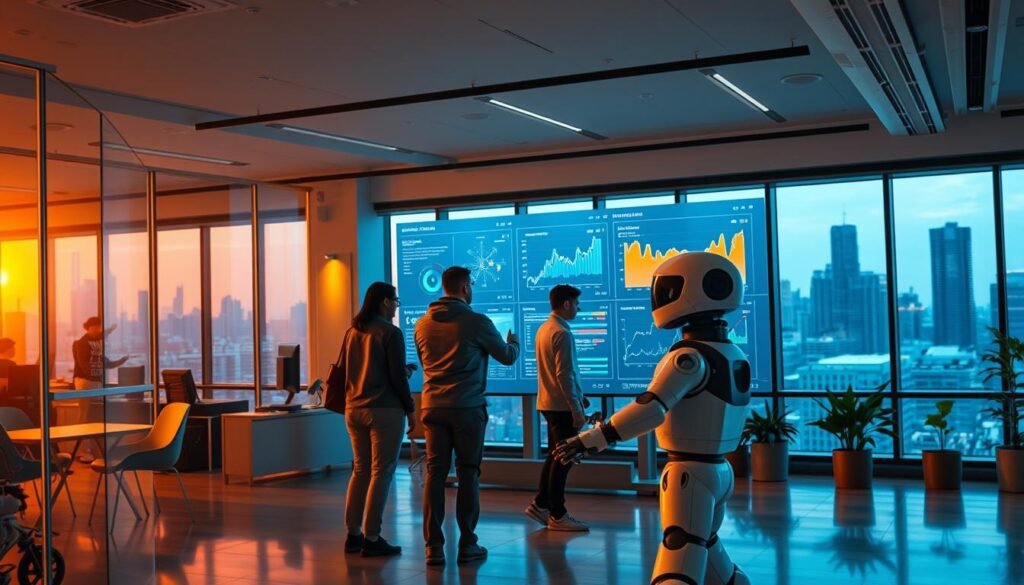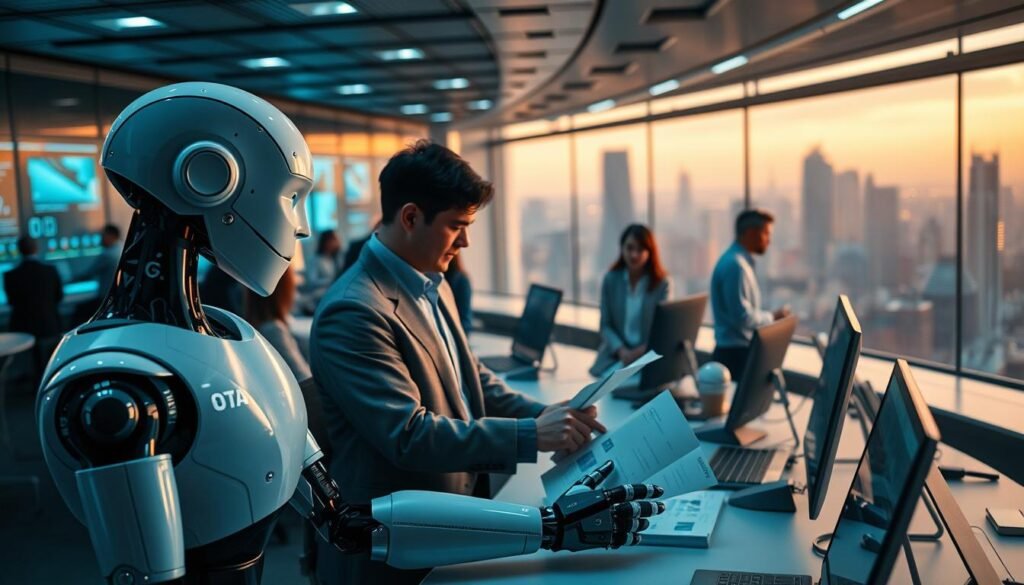Artificial intelligence is changing the business world fast. It’s opening new ways for companies to make their workplaces more efficient. The use of AI in companies is a big leap forward, not just a tech update.
Businesses are seeing big changes in how they work. AI is making things better in many areas, like supply chains and projects. By 2025, companies will spend $110 billion on AI, making them more competitive.
AI’s impact goes beyond making things automatic. It’s about making work smarter and more human-friendly. It helps people work better and make smarter choices.
Key Takeaways
- AI technologies are revolutionizing workplace dynamics
- Companies can achieve 35% reduction in supply chain waste
- Intelligent systems enable 42% faster project delivery
- AI drives data-driven decision-making processes
- Operational efficiency increases through strategic AI implementation
Understanding the Evolution of AI in Companies
The journey of AI in companies has changed a lot. It has moved from simple tools to smart systems that change how we work. Now, AI is key for businesses to stay ahead and work better.
The history of AI in companies is really interesting. It started with simple tools and grew into advanced AI that runs important business tasks. New AI technologies have changed how companies solve problems and make big decisions.
Tracing the Roots of Workplace AI Solutions
There have been big steps in using AI in companies:
- 1960s: Early computational systems emerge
- 1990s: Machine learning algorithms develop
- 2010s: Deep learning and neural networks breakthrough
- 2020s: Intelligent automation and predictive analytics mature
Corporate AI Integration Landscape
Today, AI is used in many areas, like customer service and data analysis. Businesses use AI to make things run smoother, work better, and create smarter work places.
Now, AI is not just nice to have; it’s needed to stay competitive. Companies that use AI well get big benefits in how they work, innovate, and make smart choices.
The Impact of AI on Employee Productivity and Performance

AI is changing how we work, making things more efficient. It helps employees do their jobs better by making complex tasks easier. This leads to better performance overall.
Studies show AI’s big impact on work. Advanced AI tools help workers in many fields do more in less time.
- 80% of employees report increased productivity using AI tools
- 29% of AI users feel more passionate about their work
- Organizations see productivity increases up to 40% in specific functions
Performance enhancement is more than just getting things done. AI lets workers focus on creative tasks by handling routine jobs. Those using AI daily expect big boosts in work efficiency soon.
AI also makes work more satisfying. It improves:
- Work-life balance (26% increase)
- Sense of organizational belonging (32% improvement)
- Overall job satisfaction (31% enhancement)
AI is more than just new tech—it’s a new way of working. It makes workforces more engaged, efficient, and happy.
Transforming Decision-Making Through AI-Powered Analytics

AI is changing how companies make decisions. It’s making corporate analytics better. Leaders now have access to new insights and advantages.
Businesses are using AI analytics platforms to handle big data fast. These systems offer deeper insights into complex business issues.
Real-Time Data Processing and Insights
AI algorithms analyze data quickly. This lets companies:
- Watch important business metrics live
- Spot new trends fast
- Act quickly to market changes
Predictive Analytics for Strategic Planning
Predictive intelligence is key for smart planning. AI models predict future scenarios. This helps leaders prepare for market changes and use resources wisely.
Risk Assessment and Management Solutions
AI offers advanced risk management tools. They help identify:
- Financial risks
- Cybersecurity threats
- Complex risk scenarios with high accuracy
With AI analytics, companies are moving from reactive to proactive decision-making.
Streamlining Operations with Intelligent Automation

AI is changing how companies work, making things more efficient. Businesses are finding new ways to improve their processes. This means less manual work and more done in less time. AI systems are helping companies stay ahead of the competition.
By using Robotic Process Automation (RPA) with AI, businesses can do more with less. They can automate complex tasks with great accuracy. This cuts down on mistakes and saves money.
- Inventory management optimization
- Real-time quality control processes
- Intelligent resource allocation
- Predictive maintenance scheduling
Small and medium businesses are seeing big benefits from AI. They can improve productivity by up to 40%. And they can cut costs by 20-35%.
| Automation Area | Efficiency Gain | Cost Reduction |
|---|---|---|
| Supply Chain Management | 35% | 25% |
| Administrative Processes | 40% | 40% |
| Customer Service | 30% | 30% |
Using AI wisely helps companies make their operations smoother. They can spend more time on new ideas and growth. And less time on tasks that can be automated.
AI-Enhanced Communication and Collaboration Tools
The digital workplace is changing fast thanks to AI. It’s making teams work better together, no matter where they are. New tech is removing old barriers, making work places more lively and productive.

AI is changing how we talk at work. It brings smart features that make teamwork better and faster. These tools are more than just chat apps. They offer advanced solutions for today’s businesses.
Virtual Meeting Optimization
AI is making virtual meetings better. It adds smart features that boost engagement and speed:
- Real-time language translation
- Automated meeting transcription
- Intelligent background noise cancellation
- Smart participant engagement tracking
Cross-Departmental Coordination Systems
AI helps teams talk better across departments. It breaks down old walls between teams.
| AI Coordination Feature | Business Impact |
|---|---|
| Intelligent Task Routing | Faster project completion |
| Contextual Communication Insights | Improved team collaboration |
| Predictive Resource Allocation | Enhanced operational efficiency |
Language Processing for Global Teams
AI tools help teams talk across languages. Natural language processing makes real-time translation and cultural understanding possible. This makes global teamwork smoother.
With these AI tools, companies can build more open, efficient, and connected work spaces. These spaces go beyond borders and languages.
Human Resource Management Revolution Through AI
AI is changing human resource management in big ways. It’s turning old HR practices into smart, dynamic systems. This change brings new chances for finding talent, growing employees, and making workplaces better.
AI tools are now changing how we find new employees. They use smart screening to:
- Look at candidate profiles very closely
- Find the best candidates quickly
- Help avoid unfair hiring biases
- Match people to jobs with great accuracy
AI is also making performance management better. Intelligent platforms give feedback right away. This lets employees see how they’re doing and get advice on how to improve fast.
AI is also helping keep employees happy and on board. It can:
- Guess when employees might leave
- Spot when people might not be engaged
- Offer plans to keep employees happy
- Help plan careers for each employee
With AI, HR teams are becoming more than just administrators. They’re becoming key business partners. These smart systems help companies make choices based on data. This leads to better, more productive workplaces.
Cybersecurity and Data Protection in AI-Driven Workplaces
The rise of AI in companies has changed cybersecurity a lot. It brings new chances and big challenges for keeping data safe. As tech gets better, businesses need smart plans to protect their info and keep things running smoothly.
Threat Detection and Prevention
AI-powered systems now watch for threats in real time with great accuracy. These smart tools can:
- Analyze network traffic patterns
- Identify possible security weaknesses
- Predict and stop new cyber threats
- Send out quick security alerts
Automated Security Protocols
Today’s AI helps create security plans that change fast to keep up with threats. These systems use machine learning to:
- Spot strange behavior
- Lock down systems under attack
- Take action right away
- Get better with each use
Compliance and Privacy Management
AI is changing how companies follow rules by making monitoring and management smarter. These advanced tools help businesses:
| Compliance Aspect | AI Contribution |
|---|---|
| Data Privacy | Automated personal info protection |
| Regulatory Adherence | Real-time policy enforcement |
| Risk Assessment | Predictive compliance analytics |
By using AI for cybersecurity, companies can build strong digital defenses. This protects their valuable assets while keeping things running smoothly.
Overcoming Implementation Challenges and Future Adaptations
Introducing AI in companies is a complex task. It requires careful planning to fit into existing workflows and company cultures.
Some major challenges include:
- Data quality and consistency
- Technological infrastructure compatibility
- Employee skill gaps and resistance to change
- Ethical considerations and privacy concerns
To succeed, companies need a detailed plan. They must tackle both the tech and human sides of change.
| Challenge | Potential Solution |
|---|---|
| Data Fragmentation | Implement unified data management platforms |
| Skill Gaps | Continuous training and upskilling programs |
| Cultural Resistance | Change management and transparent communication |
Smart companies see AI as a big change, not just a tech update. They need strong leadership, training for employees, and a flexible tech approach.
The future will bring AI that works better with people. It will make work smoother and more productive in many areas.
Conclusion
The business world is changing fast thanks to AI. Artificial intelligence is now a real part of our work lives. It’s making jobs more efficient and creative in many fields.
AI is changing how companies make decisions and manage their teams. Both small and big businesses see big benefits. They get more done, save money, and work smarter.
Businesses that use AI will have an edge over others. It’s not just about using new tech. It’s about knowing how AI fits into your business needs. Companies need to train their teams, use data wisely, and see AI as a team player.
The future belongs to companies that mix tech with human ideas. AI and human skills together are changing work. This partnership will shape the future of how we work.

